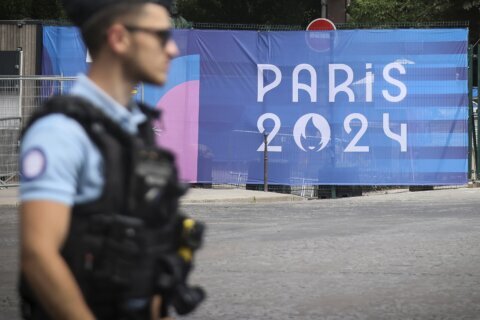When Robert Mason worked in recruitment at Clark Atlanta University in Georgia, he spent much of his time attending college fairs and meeting with interested students. But he noticed that not all historically Black colleges and universities, known as HBCUs, had the budget to send representatives to do the same.
“I was always being asked, ‘Why is this particular college not being represented or why is this particular school not here?'” says Mason, a graduate of two HBCUs, Virginia State University and Clark Atlanta. “And I didn’t have an answer.”
That changed the day he pitched an idea about a college application service to several friends who worked in admissions at other HBCUs. This was the start of the Common Black College Application, which allows students to instantly apply to more than 50 HBCUs for a one-time application fee of $20 — although the number of participating colleges can vary each admissions cycle.
About 80 students filled out the application in its first year in 1998, Mason says, a number that has since grown to more than 300,000 worldwide.
“Instead of students having to pay multiple application fees and submitting various applications, they can simply apply with one application,” says Gavin Hamms, associate vice president of enrollment management at Grambling State University, an HBCU in Louisiana. “So you see the efficiency there. We don’t want the application process to be a barrier for students who want to achieve higher education.”
[READ: How HBCUs Are Addressing the Cost of College.]
The Common Application and CBCA are similar in nature, but the main distinction is the pool of schools. CBCA is exclusive to HBCUs, while the Common App — an admissions application created by the College Board — is accepted by more than 1,000 colleges and universities, including some HBCUs.
One other key difference is the price tag. CBCA has a one-time fee, while the cost of submitting the Common App varies per institution.
Here’s what prospective students should know about filling out the Common Black College Application.
How the Common Black College Application Works
Completing the Application
Before filling out the CBCA, students must create an account. The application then asks general questions related to demographics, extracurricular activities and parent employment.
Applicants also need to provide their high school counselor’s name and email address. The counselor is then required to upload an official transcript and test scores in the portal after the application is completed.
“As far as the app itself, it takes about 15 minutes to complete, if that,” Mason says.
What Colleges Do Next
The application is made available to all participating schools once submitted. Students can select their top four enrollment preferences, which colleges can see on the back end.
“When (students) start getting interest from all these various colleges across the country through the Common Black App, they are able to be aware that college is a reality and could be a reality for them,” Hamms says.
Some schools still reach out to students even if they weren’t part of their top four selection.
[Read: A Complete Guide to the College Application Process.]
“Tennessee State University considers students who express interest in attending HBCUs and apply through the Common Black College Application,” Verontae L. Deams, the school’s assistant vice president of admissions and records, wrote in an email. “We can recruit these students and those who specifically list TSU as one of their institutions of interest.”
No changes can be made to an application once submitted. Experts say it’s important to note that some colleges may require additional information than what’s on the CBCA.
Some of the CBCA member institutions include:
— Cheyney University of Pennsylvania
— Grambling State University (LA)
— Tennessee State University
Not only can colleges offer admissions to students, but they can also provide scholarship opportunities. CBCA member institutions have awarded over $1 billion in scholarships annually, according to its website.
“Scholarships a lot of time are based upon the individual institutions,” Hamms says. “But institutions from all across the country are still able to make scholarship offers because it’s the same application process. Once you receive the data points and the information on the student, you are then able to see and match what type of scholarships they may be eligible for, which once again does help eliminate the problem of access.”
Rising Interest in Attending HBCUs
HBCUs were originally established to formally educate a community historically banned from attending U.S. colleges, specifically slaves and some of their descendants.
[Read: When to Apply to College]
In recent years, interest in HBCUs has surged. Many report receiving higher numbers of applications, which experts attribute to the rise of the Black Lives Matter movement after the death of George Floyd in 2020 and other Black Americans at the hands of police.
Enrollment at Morgan State University in Maryland, for instance, grew by 18% between fall 2018 and fall 2022, when it surpassed 9,100 students and reached an all-time high.
Some experts predict another rise in applications this fall, as well as an increase in the number of students filling out the CBCA, due to the U.S. Supreme Court’s ruling against race-conscious admissions in June 2023.
“With the political climate being what it has been prior to this current administration, students were even beginning then to (do) what I call, ‘coming back to HBCUs,'” Mason says. “And that Supreme Court decision just sort of created a situation where even more students, we are anticipating, will complete the app this year. So we’re looking for this to be a pivotal year, quite honestly.”
Last year, he adds, about 40,000 students created CBCA accounts, with about 25,000 officially completing the application.
Searching for a college? Get ourcomplete rankingsof Best Colleges.
More from U.S. News
13 Online Programs With the Most Faculty of Color
Consider Faculty Diversity When Applying to College
Avoid These Big College Application Mistakes
Common Black College Application: What to Know originally appeared on usnews.com
Update 08/28/23: This story was published at an earlier date and has been updated with new information.







